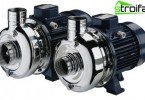How to choose a reliable gasoline generator
The most comfortable conditions in a city apartment cannot be compared with the pleasure of country walks and relaxation in the country, where a person becomes a part of nature. But completely abandoning civilized conditions is very difficult even for one day. And the trip is easily overshadowed by a blackout. You can protect yourself and your family from unexpected “surprises” with the help of a generator. There are gasoline, diesel and gas-powered models. All of them will be able to solve the problem, but the first option is the best option for a summer residence. The only question that remains open is how to choose a gasoline generator specifically for your needs from the entire range on the market.?
Content
- Is it easy to do without a source of electricity
- For the “tent” and the cottage
- How to choose the perfect model
- For consumers with high power
- What the brand is talking about
- Basic rules of operation
Is it easy to do without a source of electricity
Outside the city, a blackout and power surges are commonplace. And if this alone can just ruin the plans (it will not work to watch your favorite TV show or finish the intended business), then for others it will become a real tragedy. Souring baby food in the refrigerator, which turned into an ordinary cupboard at this time, there will be no way to cook dinner on an electric stove, to take care of a sick person in normal mode, and in winter you will have to remain without heating. The list goes on and on, so a backup source of electricity should be purchased at the stage of building a house.
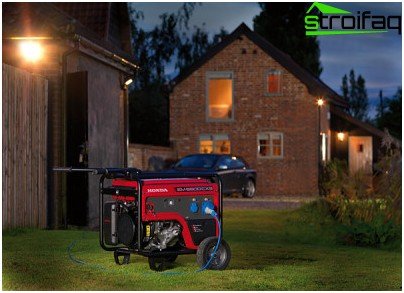
Gasoline generator will not allow power outages to disrupt plans
The market is ready to satisfy any request. And before choosing a generator for a summer residence, you need to decide what tasks it should cope with. This will ensure complete comfort and not spend extra money.
For the “tent” and the cottage
The first indicator that you need to pay attention to when choosing a unit is power.
- Up to 1 kW – good for hiking, fishing trips. It is compact equipment that is easy to transport in the form of a backpack or trolley.
- 2-5 kW – a great option for a small cottage.
- 6-10 kW – the best choice for a medium-sized country house.
- More than 10 kW – powerful equipment that can act as a stationary source of energy.
These are general indicators. To determine which generator to choose for a summer house or home, you need to add the power of all the devices that need to be connected, and multiply the resulting value by a factor (1.2-1.5). Such a reserve is necessary, because at startup some electrical equipment increases its power.
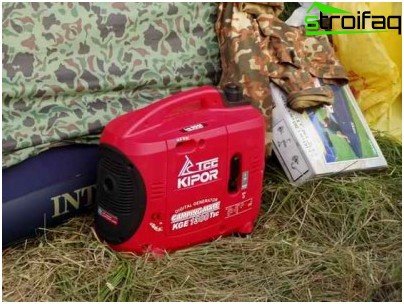
Small-capacity equipment is easy to transport, so it is indispensable for outdoor recreation
- Pumps, compressors, transformers, welding machines – 3-4 times.
- Starting power differs little from the working power of a drill, jigsaw, TV, refrigerator, computer.
- Soldering iron, iron, electric stove do not affect.
It is interesting! If the manufacturer indicates the power in kVA, then to convert to kW, the indicator must be multiplied by 0.8.
It should be borne in mind that there are different alternators.
- Synchronous easily carry short-term increased loads.
- Asynchronous are cheaper, but do not tolerate peak differences. Their advantage is the ability to maintain voltage with high accuracy, that is, they are suitable for powering highly sensitive electronic equipment.
Power surges are detrimental to the operation of the equipment. And we are talking not only about possible minor repairs, but also about the complete replacement of important parts. Therefore, it is imperative to provide a voltage regulator.
How to choose the perfect model
Ideals practically do not exist, but you can bring your purchase closer to it, given all the nuances.
- Wiring Compliance
It is imperative to provide that the phase matching of home electrical appliances and a gasoline generator coincide. With single-phase (220 V) wiring, the backup source must also be single-phase.
Important! If a three-phase (380 V) is purchased, the load is distributed so that the phase imbalance is not more than 20%. In such models, most often there is an output for single-phase voltage.
If the wiring is three-phase, and for emergency supply a single-phase unit is purchased, then the most important consumers must be connected to one phase.
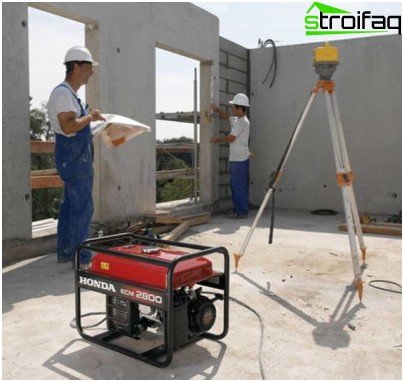
A backup power station should be purchased during the construction phase of the house.
- Cooling
Low power models are air-cooled. They do not differ in impressive mass and size, therefore they are convenient for transportation. It can run smoothly for about 8 hours. After that, it must be turned off “for relaxation”. The only exception is winter.
The model with water heating can only be moved by freight transport, but can work almost without interruption. This type is provided in medium and high power units.
- engine’s type
You can choose a gasoline generator for giving with a two-stroke or four-stroke engine. The two-stroke single-phase with an aluminum block is low-power, has a safety factor of 500 hours and is designed for short uninterrupted operation (about 3 hours). The same, but with cast-iron liners in the cylinders, designed for 1500 hours. It is small in size and convenient for frequent trips. Perfect as a backup source in the country for a short power outage.
Four-stroke with a V-shaped two-cylinder engine is designed for a long time of operation with high consumption. The most powerful is a gasoline generator with an OHV engine. It provides for the supply of oil under pressure, an automatic stop system when its level decreases, a large margin of safety (4000 hours). The engine does not make much noise during operation and is quite economical.
- Soundproofing
Starting a gasoline generator has a “soundtrack”. This causes particular discomfort if the equipment is under the window. The metal casing reduces noise, but the engine heats up very quickly in it. It will have to be stopped not after 8 hours, but after 3.
Low-revving (1500 rpm) models are less noisy, have a margin of safety for 500 hours, but are more expensive. If this stock is not enough, you should choose a high-speed (3000 rpm) station.
- Launch type
This indicator can be attributed to additional convenience (inconvenience). You can start a small generator in good weather manually. All the “taste” of torment is felt upon arrival in winter, when a frosty sunny day simply beckoned to the country. And almost all high-power models are wound up with a key, otherwise the process will turn into a real test.
For consumers with high power
Thinking about which generator to choose, one cannot ignore electrical equipment, which is used not only for domestic purposes, but also provides daily work and the construction process. If the total power is more than 20 kW (do not forget about the stock!), It is worth considering diesel models. They are more expensive, but very reliable and economical..
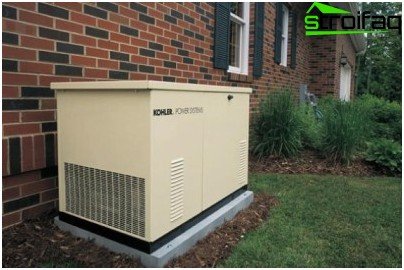
Diesel models can ensure the smooth operation of many consumers
There are no separate recommendations on how to choose a diesel generator. They differ in the same indicators as gasoline. But for many, priority may be not only high power, but also the type of fuel that is economically viable.
What the brand is talking about
The main criteria in determining the manufacturer should be the availability of spare parts, service. Be sure to verify the availability of the certificate. Important is the warranty period. It can reach 5 years from the date of sale.
Unambiguous preference to give foreign-made goods is not worth it. The main reason is the quality of fuel in our country, which differs from that for which the generator resource is designed. But here everything is individual.
Basic rules of operation
Any model requires proper operation and respect. To extend the operation of the installation, it is necessary to carry out simple measures.
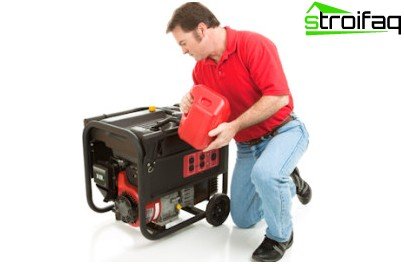
Only proper care and respect will extend the life of the device.
- Pay attention to routine inspection. Frequency depends on power and resource..
- Change oil in time. Use only brand recommended for specific engine.
- Do not connect or disconnect devices while the station is running.
- Do not overheat.
- Follow the operating instructions in the documents.
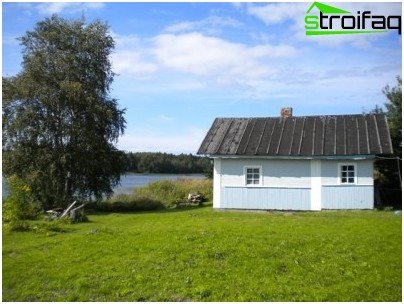
The generator provides a comfortable stay and away from civilization
With such a power station, you can not only lightly wait out the temporary power outage, but also provide comfortable conditions in a completely uninhabited place. Maybe this is the “piece” of paradise?





